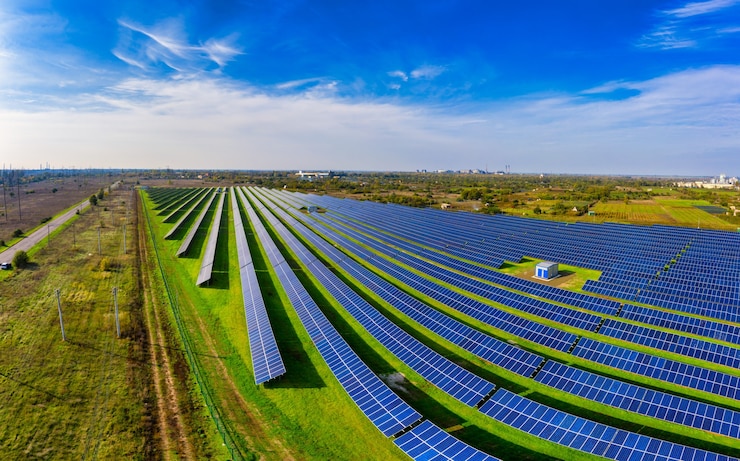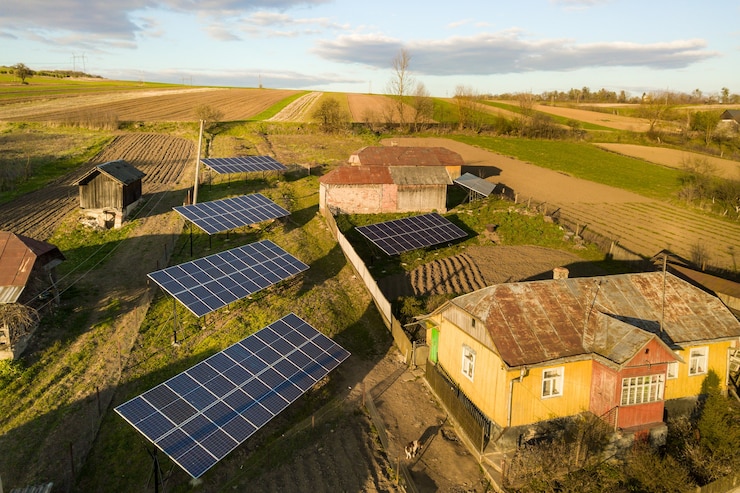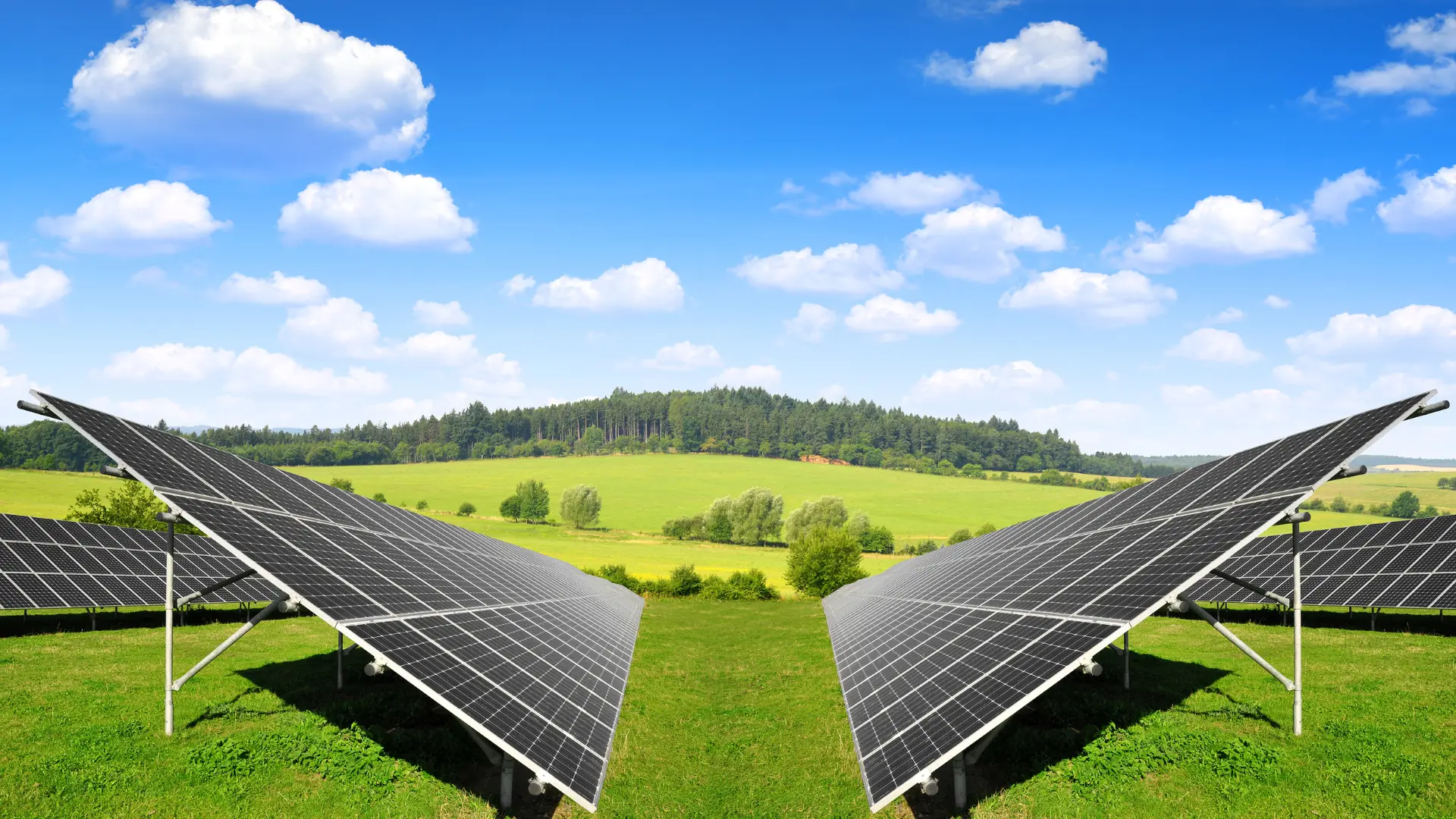Commercial Solar for Agriculture Systems
Is solar energy a practical choice for farms and agriculture? Surprisingly, the answer is yes. Beyond the traditional images of irrigation systems, smart technology has made solar power a valuable asset in farming. Explore the applications of Solar for Agriculture in this blog.
Solar For Agriculture

Larger commercial solar panels generating more watts per panel are crucial in empowering farmers and growers through solar for agriculture. They enable harnessing solar power, cutting electricity expenses, and naturally enhancing the quality of their produce.
Improved Tech and New Advancements
Recent advancements in commercial solar technology have streamlined the process of integrating power into farms and agricultural production spaces at more competitive prices. The industry’s expansion, coupled with improved products and technology, is driving down the cost of adopting solar for agriculture solutions for commercial clients.
Continual technological advancements are lowering costs and introducing innovative solar energy applications in farming. These thoughtful strides empower farmers and ranchers to adopt solar for agriculture solutions, reducing energy costs per acre and enhancing agricultural productivity. This progress is significant for farming and technology companies and solar producers actively participating in these advancements.
Why Farms are Moving to Solar Energy

Farmers often turn to solar energy for its simplicity in adding power to rural and remote sections of their farms, particularly on extensive farmlands. Traditional methods involved costly installations of poles, wiring, or trenches with conduits. Solar farms provides a swift and adaptable solution, offering a quick and customizable way to bring power to specific areas of the farm where it is needed the most.
Enhancing Energy Control for Agricultural Operations with Solar Power
Farmers today increasingly turn to solar energy solutions to better control their energy supply. This shift is particularly crucial in regions like California, where the threat of wildfires has led to Public Safety Power Shutoffs (PSPS) by local utilities. These blackouts, extending up to ten days, pose a significant risk to crop growth and various agriculture production areas. Solar energy emerges as a sustainable solution in such challenging circumstances, providing a reliable power source for essential farming operations.
1. Overcoming the Challenge of Power Outages
Traditionally, farmers had limited options to bring power to rural and remote areas of their farms. Conventional methods involved installing poles, running wires, or digging trenches to install conduits. These approaches were not only expensive but also time-consuming. Solar energy addresses these challenges effectively with its quick deployment and customizable nature. It offers farmers a rapid and efficient way to bring power precisely where it is needed the most on their farms.
2. Adapting to California’s Public Safety Power Shutoffs
In regions facing the threat of wildfires, such as California, solar energy provides a reliable solution to counteract the impact of Public Safety Power Shutoffs. These shutoffs, implemented by local utilities to prevent wildfires, can last for extended periods, up to ten days. During such disruptions, traditional power sources become unavailable, posing a severe risk to essential farming activities. Solar energy ensures a continuous power supply, enabling farmers to operate water pumps, irrigation systems, and other critical infrastructure, preventing crop damage and water shortages.
3. Powering Smart Technology for Precision Agriculture
Solar energy addresses immediate power needs and facilitates the integration of smart technology in agriculture. Farmers can establish smaller solar-powered stations that supply energy to devices collecting data on crop and soil conditions. Smart controllers, powered by solar energy, precisely monitor soil moisture levels and water plants when needed. This approach conserves energy and optimizes water usage, contributing to sustainable farming practices.
4. Remote Monitoring for Improved Farm Management
Farmers can establish remote monitoring systems with solar-powered solutions, allowing them to oversee field conditions through smart devices, tablets, or laptops. This level of control enhances precision in crop care, agriculture land management, and overall farm operations. Wireless communication enables real-time data collection and analysis, empowering farmers with actionable insights for informed decision-making.
Farming with Solar Energy
Solar energy plays a crucial role in agriculture, going beyond water extraction. It influences various farming aspects, offering benefits such as:
- Drying Crops: Farmers can efficiently and cost-effectively dry harvested crops using solar heat collectors.
- Heating Homes: Many heating and cooling systems can be adapted to harness solar energy, applicable to homes, livestock barns, and enclosures.
- Greenhouse Temperature Control: Solar heating for greenhouses allows farmers to extend or protect crop growth.
- Warm Water Supply: Solar energy can provide warm water for dairy barns, processing facilities, and cleaning poultry runs.
Solar power enables farmers to extend growing seasons, fostering the cultivation of climate-sensitive plants and extending growth periods for existing crops. The advantages of solar energy resonate across the agriculture sector, benefiting dairies, ranches, nurseries, and farms facing challenges from climate change and unpredictable weather conditions.
Benefits of Solar for Farms and the Agriculture Sector

The array of advantages for a farmer or agricultural producer is extensive. These encompass:
1. Energy Independence:
Solar energy allows you to take charge of your energy usage, freeing yourself from vulnerabilities such as Public Safety Power Shut Offs or the escalating costs of grid-generated electricity. Your crops or livestock won’t suffer due to power shortages, and you’re liberated from tiered pricing systems, enabling you to use power on your farm without restrictions. Solar energy empowers you to utilize energy as needed without concerns about peak-hour expenses.
2. Cost Savings:
Going solar brings several cost-saving benefits for farmers and ag producers. Firstly, there are the direct savings from not paying for electricity. In many U.S. states, there’s the opportunity to earn money by selling excess energy back to the local electricity grid. Moreover, the ability to accomplish more with less means you can expand your business without the burden of increased energy costs, especially during events like Public Safety Power Shutoffs. The implementation of solar energy can contribute to higher yields.
3. Energy Efficiency:
Going solar also presents an opportunity to optimize energy usage. Upgrading to energy-efficient appliances allows farmers to achieve more while consuming less energy. Optimizing energy use in farming and ag production ensures energy is available when most needed. Solar, coupled with streamlined energy usage, extends the impact of your investment, as you’re saving on electricity costs and enhancing energy efficiency.
4. Time, Energy, and Effort Savings:
Solar adoption allows farmers to install small-scale, remote, and cost-effective solar arrays to power technologies that streamline processes, saving time, energy, and effort. Implementing small solar projects enables the use of technology for water delivery management, soil moisture monitoring, issue reporting, and water conservation, resulting in larger, cleaner, and higher-quality harvests. With solar, the control of energy is entirely in the hands of the farmer, cutting utility costs and maintenance efforts.
5. Environmental Conservation:
Going solar contributes to a reduction in traditionally generated electricity, often derived from burning fossil fuels. This shift to green electricity helps combat the detrimental effects of greenhouse gas emissions on farming and crop production. The environmental footprint of crop cultivation or livestock raising diminishes as more farms adopt solar energy. This reduction benefits the environment and positively impacts the bottom line, aligning with sustainable and eco-friendly agricultural practices.
How to Get Started
Take a moment to contemplate the potential advantages of integrating solar power into your farm and business. Are there untapped opportunities in remote areas of your farm that remain unexplored due to the high costs associated with running power lines? Is installing heating systems in barns, pens, and greenhouses deemed too expensive due to electricity costs? Going solar extends beyond merely providing renewable energy for your residence and office; it encompasses clean energy production to meet your current energy needs and anticipate future requirements.
Solar Earth Inc recognizes each farm or ranch’s distinctiveness as a leading commercial solar contractor, even if they cultivate similar crops. Every property encounters unique challenges that shape their operations and business strategies.
To tackle these individual challenges, Solar Earth Inc. assesses the energy objectives, current energy consumption, potential benefits offered by solar solutions, and energy-efficient alternatives. Subsequently, a tailored plan is developed to address these specific concerns.
Installing solar systems on farms goes beyond placing panels on barn roofs and leaving them at that. It involves understanding the energy requirements and growth prospects and collaborating with farms of varying scales, from large to small, including hobby farms. The ultimate aim is to bring about significant enhancements, year-over-year cost savings, and resilience in environmental challenges such as wildfires.
If you are a farmer or agricultural producer contemplating the advantages of adopting clean energy, specifically solar, for your farming operations, consider contacting Solar Earth. Their expertise can provide valuable insights into how solar energy can benefit your business, contributing to economic efficiency and environmental sustainability.
Contact Our Friendly, Knowledgeable Staff
Solar Earth Inc., with expertise and certifications, empowers your home for enhanced energy generation. Contact us today to transform your home into a sustainable, long-term renewable energy source.
